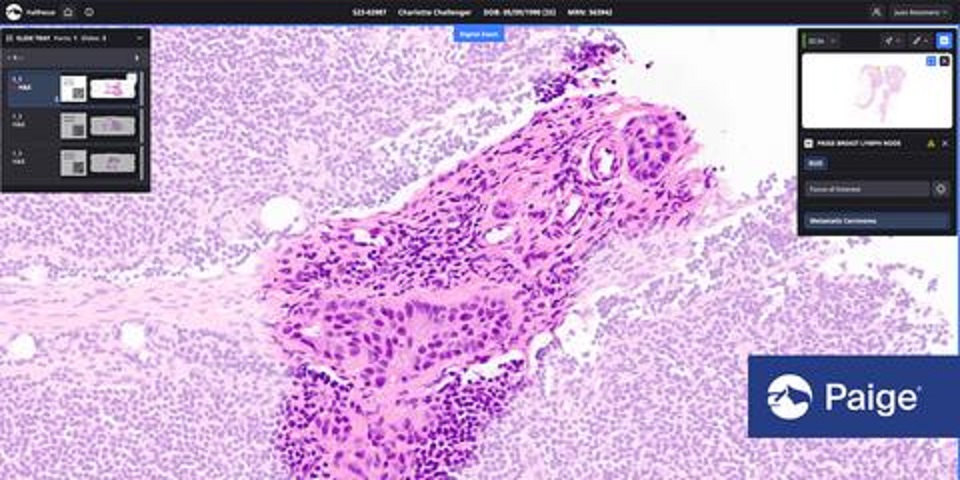
Paige redefines cancer detection with a groundbreaking AI derived from the Virchow Pathology Foundation Model. This innovation spans over 17 tissue types, including rare tumors and metastatic deposits. By leveraging a vast repository of 4 million digitized slides, Paige surpasses traditional limitations, enabling efficient multi-tissue cancer diagnosis. Dr. Siqi Liu emphasizes the model’s success, owing to diverse, high-quality datasets. This achievement offers potent tools for diagnosis, prognosis, and precision therapy. Paige’s commitment to FDA oversight underscores its pursuit of clinical-grade accuracy. The Foundation Model’s versatility extends to broader healthcare applications, promising deeper insights into cancer behavior and treatment responses.
Paige, a pioneer in digital pathology and clinical AI, unveils a transformative AI product derived from the Virchow Pathology Foundation Model. This innovation marks a paradigm shift in cancer detection, spanning an unprecedented 17 tissue types, from skin to rare tumors and metastatic sites. Traditional AI approaches require extensive time and individual tissue datasets. However, Paige’s breakthrough harnesses a colossal library of 4 million digitized slides, eliminating these constraints and enabling the creation of multi-tissue cancer detection AI. Dr. Siqi Liu highlights the model’s success, by leveraging vast, diverse datasets. This development signifies a significant leap in cancer diagnostics, promising robust tools for precision medicine and prognosis.
Traditionally, the development of AI applications for cancer detection in pathology demanded extensive datasets, focusing on individual tissue types and consuming considerable time, often spanning months or years to achieve clinical-grade accuracy. Paige has transcended these limitations by harnessing its distinctive Foundation Model. Drawing from a repository of over 4 million digitized slides, Paige has devised an innovative approach that breaks the barriers of creating singular tissue-specific products, thereby enabling the efficient creation of AI-driven cancer detection applications across diverse tumor types—a remarkable feat in AI-based cancer diagnosis.
Paige’s AI Revolutionizes Multi-Tissue Cancer Detection
Dr. Siqi Liu, Director of AI Science at Paige, attributed the early success of the Foundation Model to the vastness, quality, and diversity of the datasets employed in its construction. “Paige boasts access to one of the world’s largest and most esteemed pathology datasets, empowering us to employ state-of-the-art deep-learning methodologies to train systems for the detection of common, intricate, and even exceedingly rare cancer types,” Dr. Liu stated. He emphasized how Paige’s development signifies a pivotal advancement, providing the pathology community with robust tools for diagnosis, prognosis, biomarker exploration, and precision therapy patient selection.
The unparalleled performance of Paige’s multi-cancer application across diverse tissue types is heralded as the epitome of excellence in cancer pathology AI. Paige remains steadfast in its commitment to ensuring clinical-grade accuracy for its AI applications, thereby actively pursuing FDA regulatory oversight for products built on Foundation Model technology.
Andy Moye, CEO of Paige, underscored the importance of FDA clearance in upholding regulatory and safety standards in the realm of AI-driven cancer diagnostics spanning various tumor types. Moye highlighted Paige’s dedication to innovation and regulatory milestones, expressing optimism about the far-reaching benefits of the multi-tissue detection model for patients, pathologists, and the wider medical community. This monumental achievement signifies Paige’s unwavering pursuit of excellence, representing a significant stride forward in cancer diagnostics.
Razik Yousfi, Senior Vice President of Technology at Paige, shed light on the broader implications of the Foundation Model’s versatility. Yousfi highlighted that beyond its multi-tissue capabilities, the Foundation Model and its embeddings could serve as crucial components in diverse applications along the healthcare continuum. By amalgamating the outputs of the Foundation Model with various data types from other medical modalities such as genomics, radiology, and health records, one could unlock substantially greater insights into cancer’s nature, behavior, and responses to specific treatments.
Paige’s pioneering AI in multi-tissue cancer detection marks a monumental advancement in pathology. The Foundation Model, derived from an expansive dataset, shatters barriers, offering clinicians unprecedented diagnostic capabilities across diverse tissue types. Dr. Siqi Liu’s emphasis on data diversity underscores the model’s success, promising potent tools for precision therapy and prognosis. Paige’s commitment to FDA oversight reaffirms its dedication to clinical accuracy. Moreover, the Foundation Model’s versatility extends beyond cancer detection, holding promise for broader healthcare applications. This groundbreaking achievement propels Paige to the forefront of innovation, revolutionizing cancer diagnostics and treatment strategies while unveiling deeper insights into cancer behavior and treatment responses.




